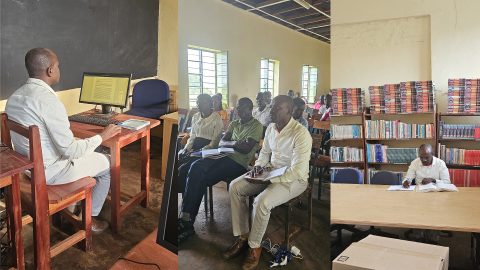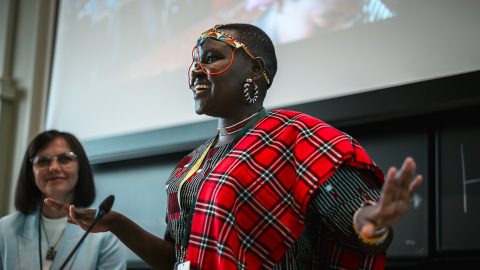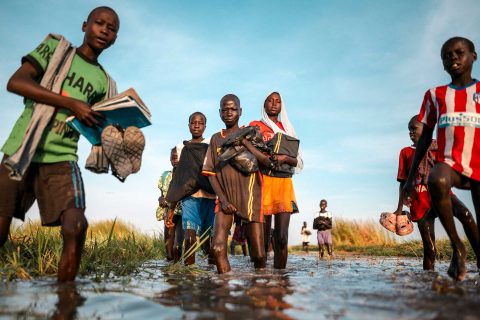Repairing schools in the midst of war is useless, isn’t it? FCA’s education specialist Pauliina Kemppainen responds to 13 tough claims.
In front of 200 first graders in Uganda, Pauliina Kemppainen understands that it’s not always possible to complain about class size. Now, the senior education expert answers a numbers of comments that pop up on FCA’s social media. This is how Kemppainen survived on the spot.
“All children should be in school”
You’ve previously worked as a teacher, volunteered for Teachers Without Borders, and have plenty of international experience in education. You think the best thing in the world is children getting to go to school.
Absolutely. Children have the right to go to school everywhere in the world, regardless of their background.
“Teachers carry a great responsibility”
Finn Church Aid trains teachers. That’s important, because teachers are raising a new generation.
Most kids and young people attending education spend more time at school and with the adults at school than with their parents. The more competent and better educated the teachers are, the better their opportunities are to support the kids and adolescents they spend their days with.
“Best way to help children in developing countries is to donate notebooks and pens”
The best way to help school children is to provide schools with materials such as notebooks, pencil cases, and ABC books.
The materials are a part of school, but ABC books and pencils don’t do much teaching without a trained teacher. If I had to choose between a teacher and a pencil, I’d go for a teacher every time.
“Building schools in war zones is a waste of money”
Finn Church Aid repairs schools in conflict zones. That’s not very smart, because war can damage the schools again.
We use fields to grow the grain we eat. Is it smart to grow grain again? I’d say it is. Similarly, there’s a reason to repair the schools, because there will always be new children and young people who need a school to support their growth and development.
“Why only girls’ education gets support?”
At least in Finland boys are doing worse at school than girls. It’s odd that Finn Church Aid focuses so strongly on girls’ education.
We focus on everyone’s education. It’s just as important for boys and men to go to school as it for is girls and women. However, girls are in a weaker position than boys to start with: their education is still obstructed in various places. In order to reach the same starting point as boys, girls need an extra boost, which we are trying to give them without hindering boys’ opportunities.
“There are children in need in Finland, too”
Why are you training people abroad? There are plenty of children and young people in Finland who need support in school.
Each and every Finnish child and adolescent has the right to go to school just like children and young people in Central African Republic, Kenya, and Myanmar. In Finland, there are resources and opportunities for education even without Finn Church Aid.
“Education gets wasted if people live in mudhuts”
It makes no sense to train people living in mudhuts without a livelihood. The basics should be sorted out first.
Whether the person wakes up in the morning in a house made of mud, brick, or wood has nothing to do with how skilled they are or how productive they are for society. Education is a human right and the first basic thing that needs to be fixed. Hence, we at Finn Church Aid invest in vocational training in the fields that are in demand in our regions of operation.
“Those educated with development aid never get a job”
Development co-operation is only used to train mechanics, carpenters, and hairdressers. Some of them will never be employed.
Planning vocational training always begins with a market analysis, so we can outline the fields of expertise that are required locally. If the region really needs more carpenters, we’ll train carpenters – but just as many as are needed. We won’t train a thousand, if there is only need for ten. In addition to traditional professions, there is also demand for digital-based professions such as graphic designers, photographers, and web designers, which are part of today’s world but also the future.
“The use of cash distributions should be strictly decided by aid organisations”
FCA has distributed cash allowances to families. Cash is important, and it can be used to cover expenses like school transport.
Cash allowances are an important form of aid, because they give families the opportunity the decide what to spend the money on. It’s part of a humane life to be able to make decisions as to how to use one’s money and be an active agent instead of a passive aid recipient.
“Wrong things are taught in schools in the developing countries”
In many schools supported by FCA the only point for education is to study the Quran or the Bible.
We don’t do missionary work. We always try and co-operate with local education authorities, if it’s ethically possible and in line with international law. If we were to build a parallel education system, it would collapse after we leave. If the local curriculum contains lessons of Quran or, for example, a Buddhist faith, it’s our responsibility to enable teaching them in school. We have no right to decide what religions are taught.
“Education is important to children living in the middle of conflicts”
Education plays a significant role in rebuilding Syria and Ukraine, for example.
Yes. Education is a human right, whatever the surrounding situation is. It’s not the fault of the children and young people if there’s a war raging around them. Education and going to school are important not only from an educational perspective but also for providing psychological support. Going back to school creates and re-establishes routines, brings back memories from life before war, and adds meaning to the day by offering something meaningful to do. Through vocational education we can train people in professions that are especially needed in reconstruction.
“It’s more safe to stay home in the developing countries”
Many children in developing countries must travel long and unsafe distances to attend school. It would be safer to stay home.
Things can happen during school journeys – in Finland, too. Do we still choose not to send our children to school, or do we try to improve the safety of the route? People everywhere in the world think the same and aim to ensure the safety of their children’s schooling. With the help of education, people learn to read and write, which helps them be better off in the world.
Again and again, studies show that the most efficient way for families to rise from poverty is educating women. In comparison to uneducated women, educated women are more likely to send their children to school. Yes, there are risks, but are they big enough to make education not worth it?
“Finns can’t learn anything from the developing countries”
The Finnish education system is so superior in comparison to others that there’s nothing we can learn from anyone else.
That’s a bold statement! Are we Finns overall so superior next to others that there are no lessons we could learn from anyone? Have we, completely on our own, created the large school reforms that form the basis of our success? Or have we maybe learned something from somewhere in order to be able to make these changes? I spent a year in Uganda as a volunteer for Teachers Without Borders. I had been trained in Finland, and I was shocked. Previously I had complained about having 24 kids in class, but in a refugee centre in Uganda, teachers had up to 200 first graders in a classroom. I had to rethink teaching entirely. For me, it was a huge learning process.
Text: Elisa Rimaila
Photo: Antti Yrjönen


